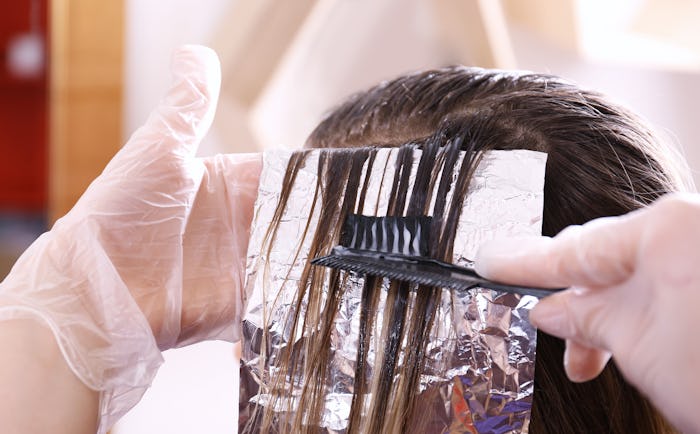News

Can Permanent Hair Dyes & Straighteners Cause Breast Cancer? An Expert Weighs In
It seems like every other day there's new concerning research warning of serious health risks related to common household items, like this new study claiming permanent hair dyes and straighteners are possibly linked to higher breast cancer risk. But is there real cause for concern? Dr. Elizabeth Arena, a Board-Certified Surgical Oncologist specializing in breast cancer at Surgery Group of Los Angeles, weighed in on the findings in an email conversation with Romper.
A study published Wednesday in the International Journal of Cancer found women using permanent hair dyes and straighteners had a potentially higher risk of developing breast cancer than women who didn’t use those products. The findings were especially devastating for women of color, as 45% of black women had a higher breast cancer risk compared to 7% of white women, according to Essence.
As for straightener use (chemical products, not the hair tools), there's an 18% higher breast cancer risk for black women. And "women who used chemical hair straighteners at least every five to eight weeks were about 30% more likely to develop breast cancer than those who didn't use these products," according to WebMD.
As for how researchers determined the findings, they "analyzed data from an ongoing study called the Sister Study, looking at medical records and lifestyle surveys from 46,709 women between the ages of 35 and 74," according to NPR. Women responded to questions about their use of hair dyes and straighteners, with researchers following-up with the participants throughout an 8-year timespan.
Scientists aren't sure what ingredients are related to the increased risk, and it's important to note all women in the study had a sister who was diagnosed with breast cancer, meaning they were already genetically predisposed to the illness.
Although these findings are alarming at face value, Dr. Arena advises consumers shouldn't be too worried. "Risk for breast cancer is multifactorial, and in many patients it is related to their genetics and family history rather than environmental exposures. Based on this observational study alone, I do not think women should be overly concerned," she says via email.
Outside of genetics, Dr. Arena explains how women are largely in control of their risk factors for developing breast cancer. "The best approach to reducing risk is to maintain a healthy lifestyle similar to what is recommended for other diseases - like eating a healthy diet, exercising regularly, limiting alcohol intake, reducing stress," she shares. "I also strongly recommend regular screening for breast cancer because early detection is the most effective way to treat the disease should it occur."
Still, it's hard to ignore the especially concerning stats for women of color. On this topic, Dr. Arena warns it's difficult to nail down the scientific reasoning behind the numbers as "the study did not describe in detail the products that the participants used."
Dr. Arena added, "In theory, different products, with different chemical components, may be designed for people of different racial background, which could contribute to the different cancer rates, while different hair types may take up the dyes differently as well."
If you're still concerned about this study, Dr. Arena suggests paying closer attention to the hair products you use at home, as this area the isn't "tightly regulated" by the FDA.
What's more? Consider using temporary dyes because "they do not require the same chemicals to alter the hair shaft to take up the dye, while semi-permanent dyes may contain fewer chemical preservatives than traditional permanent dyes." Another option is to "decrease the frequency of hair dye use."
A study involving health risks can be scary, so reach out to your doctor for more information if you're still concerned. And like Dr. Arena mentioned, make sure you get regular breast cancer screenings.
Studies referenced:
Eberle, C., Sandler, D., Taylor, K., White, A., (2019) Hair dye and chemical straightener use and breast cancer risk in a large US population of black and white women, International Journal of Cancer DOI: 10.1002/ijc.32738
Experts:
Dr. Elizabeth Arena, a Board-Certified Surgical Oncologist specializing in breast cancer at Surgery Group of Los Angeles